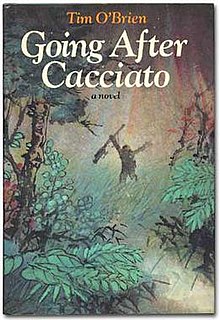Going After Cacciato

First edition
|
|
| Author | Tim O'Brien |
|---|---|
| Country | United States |
| Language | English |
| Genre | War novel |
| Publisher |
Delacorte Press (US) Jonathan Cape (UK) |
|
Publication date
|
January 1978 |
| Media type | Print (hardback & paperback) |
| Pages | 352 |
| ISBN | |
| OCLC | 3240718 |
| 813/.5/4 | |
| LC Class | PZ4.O1362 Go PS3565.B75 |
Going After Cacciato is an anti-war novel written by Tim O'Brien and first published by Delacorte Press in 1978. It won the U.S. National Book Award for Fiction. O'Brien himself says that "Going After Cacciato is called a war novel. It is not. It is a peace novel."
This complex novel is set during the Vietnam War and is told from the third person limited point of view of the protagonist, Paul Berlin. The story traces the events that ensue after Cacciato, a member of Berlin's squad, decides to go AWOL by walking from Vietnam to France, through Asia. Cacciato means "hunted"/"caught" in Italian.
Typical of many stories that deal with themes of psychological trauma, Going After Cacciato contains distinct ambiguities concerning the nature and order of events that occur. The chronology is nonlinear for most of the book.
The main idea of the story is, by O'Brien's estimation, that being a soldier in Vietnam for the standard tour of duty entails constant walking; if one were to put all the walking in a straight line, one would end up in Paris, where Cacciato is going.
Paul Berlin, the main character, is a frustrated soldier. During one night while on watch duty, Paul Berlin thinks about the past and events that lead him to daydream about going to Paris. The courage it takes to chase one's dreams is a recurring theme, which is often expressed through Paul Berlin's reveries.
Cacciato, who is always portrayed as self-sufficient and happy, is pursued by Berlin and his comrades in arms. Cacciato's actions are sometimes portrayed as those of a man who is not particularly bright or gifted, but who is untroubled by the larger questions of the war itself.
In the chapter "Tunneling Toward Paris", the characters escape the endless tunnels by "falling out" just as they fell in; this allusion to Alice In Wonderland helps to reveal the story as surrealistic fiction. This surrealism also appears earlier in the novel, when Cacciato flies off a mountain.
...
Wikipedia
